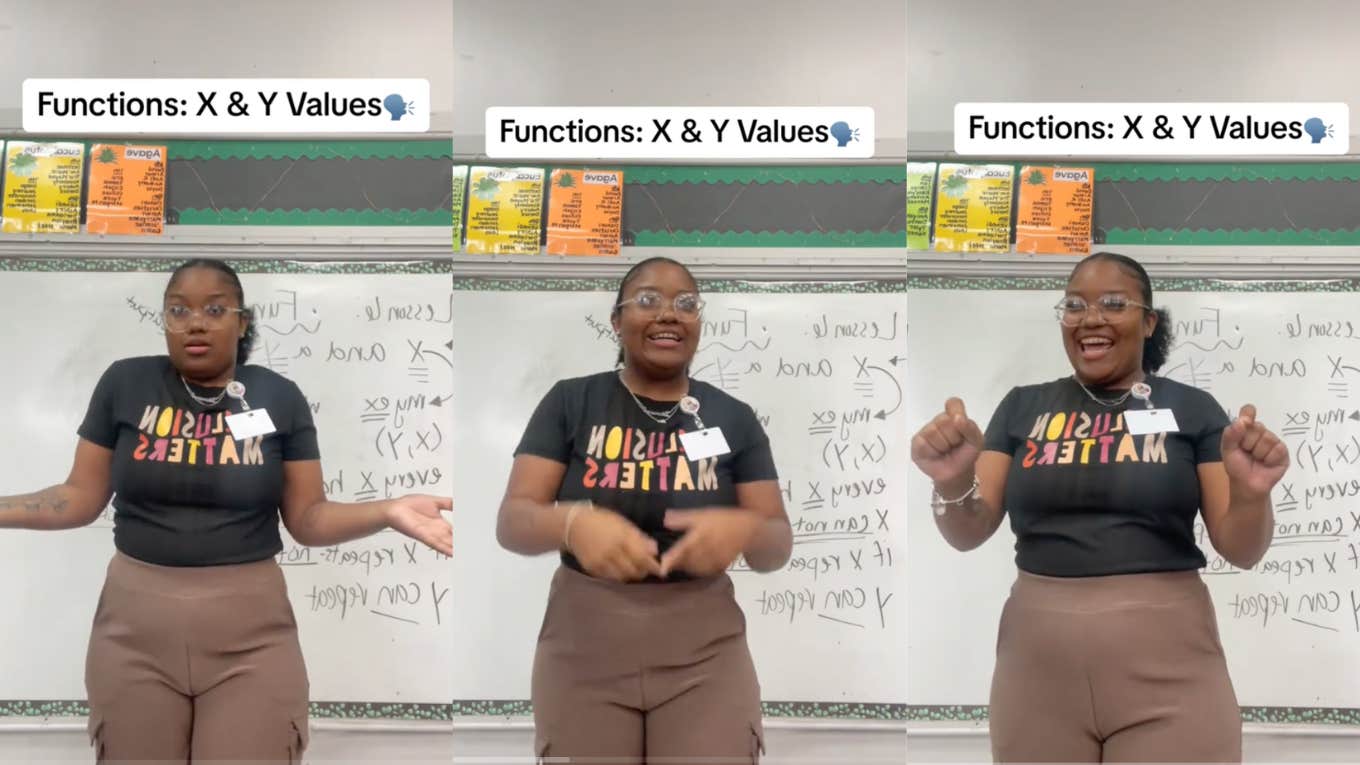Math Teacher Applauded For Unconventional Algebra Lesson About Not Getting Back With Your Ex
She took a math lesson and made it a life lesson, too.
 @captainch4risma / TikTok
@captainch4risma / TikTok Were you a kid who struggled in math class? If so, vivid recollections of poring over algebra homework trying to understand the inscrutable equations are probably core memories from your school years.
But what if your teacher had tied algebra to something relevant to your day-to-day life — like your messy teenage dating life? That's the approach one teacher on TikTok took, and it's not only hilarious, but judging from her students' responses, it actually works.
The teacher uses dating to teach algebra concepts.
Ms. Diamond, a math teacher known as @captainch4risma on TikTok, has gone viral several times for her unconventional lessons that take her students' interests and transform them into unforgettable lessons about mathematics, like this ingenious lesson that turns Missy Elliott's "Work It" into a lesson fractions.
The unforgettable part is particularly fascinating because, quickly: Name one high-level algebra lesson from high school you've actually retained all these years later. Chances are, unless you work in a STEM field, you can't come up with a single one, right?
But it's hard to imagine Ms. Diamond's kids ever forgetting a single concept, and her recent lesson on functions is a perfect example.
Diamond used a lesson on 'why' you should never get back together with your 'ex' to teach how X and Y work in algebraic functions.
The concept alone is pretty darn clever, but the way her students seem not to be missing a single concept shows just how ingenious Ms. Diamond's methods really are.
In math, functions describe a relationship between an independent variable and a dependent variable, which in Ms. Diamond's lesson are represented by X and Y, as in many algebra equations. As Ms. Diamond put it, "Every X has to have a Y," and to demonstrate this, she used a call-and-response method with her students that led them through a scenario we can all understand — figuring out "why" we dated an "ex," and why we shouldn't get back with them.
"When you think about X, you think of 'my ex.' And when you think about Y, you think of 'why did I date you?'" She then used the dating analogy to review with her students how X and Y operate in functions, asking the students "Can X repeat itself?"
The answer is no because if X repeats itself, it's "not a function," just like going back to an ex is "not functioning" in your life — that is, in Ms. Diamond's words, "You broke up with them one time for a reason, you probably gonna break up with them again for the same reason."
Y, on the other hand, can be repeated. "I can date 1,000 people and have the same reason" — that is, the same "why" or Y — "for breaking up with each one of them," Diamond explained. Therefore, X and Y functions can be explained by the solid dating advice that you should "not date the same person you dated before."
I'm so bad at math and so far removed from algebra at my age that I have to admit I still don't fully get it and probably never will. (I have a degree in theater, after all.) But Ms. Diamond's students clearly did get it — they were right there with her every step of the way through the lesson, and it turns out that's not a coincidence.
Studies have shown that teaching methods like Ms. Diamond's help students retain far more information.
Ms. Diamond has gotten a fair amount of pushback for her methods (much of it, it must be said, seeming to have racial undertones). But methods like hers are well known to be superior when it comes to engaging students and helping them actually retain concepts.
A 2019 study at Harvard University found that active learning — lessons that engage students and require participation, often through creative means, like those Ms. Diamond uses — are vastly more effective than standard lectures.
The study found that even when students felt like they'd learned more from a lecture, their test scores significantly lagged behind those who'd learned the same concepts via active learning. Some active learning techniques have been found to help lower stress levels in kids as well.
The response of many people in Ms. Diamond's comments certainly bore this out. "Do I, an English teacher, need to know anything about functions? Nope," one woman commented. "Did I watch this whole video and get really into it? Absolutely!"
Others applauded her for turning math into an opportunity to learn an essential skill that all of us could use. As one commenter put it, "She is not only teaching math... she is teaching life!"
And when it comes to that whole "Y did I go back to my X?!" thing? Well, Ms. Diamond's kids just might be the first group of people to ever not have to learn that lesson the hard way.
John Sundholm is a news and entertainment writer who covers pop culture, social justice and human interest topics.

